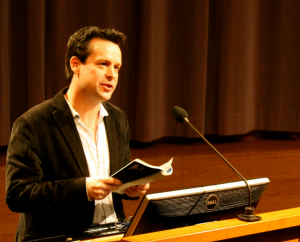
Welcome to “Behind the Byline,” the column in which we share conversations with current NER writers in all genres.
This month, NER poetry editor Rick Barot speaks with poet Kevin Prufer.
RB: Your poem “In the Wheat Field” has a disturbingly memorable opening. Can you talk about that opening moment, and the things that gave rise to the poem in general?
KP: Oddly, that’s the hardest thing for me to talk about because I don’t know the poem’s source! Some time ago, I went through a period of reading memoirs, novels, and accounts of wartime. And I recalled a scene in which a man fires on a child at the urging of another, who calls the child a rabbit. It disturbed me and a year or so later that little snippet of narrative made it into my poem. After I finished a very early draft of “In the Wheat Field,” I went back through my books to find the scene—I wanted to be accurate and to know if it was factual or invented—but I could never find it and even began to wonder if I’d imagined it. As I revised the poem, that tiny moment—perhaps from someone else’s story?—grew large and fictional in my telling, and then retreated into the mind of an anxious speaker who recalls reading a whole book about it, a book that certainly doesn’t really exist.
RB: You have now published six collections of poetry, and one theme that has increasingly informed your poetry is a sense of the world gone wrong. I consider you one of the most powerful political poets we now have in American poetry. Do you consider yourself a political poet? And if so, what do you think it means to be a political poet these days—or a political artist, for that matter.
KP: One of the things I think poetry is best at is communicating the sense of a mind at work on an unsolvable problem—that is, enacting the processes of that mind through poetic music, measure, ambivalence, and ambiguity. I’m attracted to the idea that a poem may be political in that it engages in complex, many-minded political thought—that the point of such a poem might not be advocacy (though there’s certainly room for that) but that it might give a complex political subject the emotional and intellectual thinking it deserves.
Put another way, we live in a world in which we are surrounded by people asking for our vote, our political support, our social allegiance. The voices accost us from television, radio, the internet—and almost invariably simplify enormously complex political questions into simple (and often self-interested) advocacy. In this environment, the kind of complex, polyvalent thinking poetry creates and enacts can itself be a valuable political act, deepening and broadening political discourse and our sense of a turbulent, troubling, intricate political world.
I guess this is a long way of saying that I really do consider myself a political poet and often find myself writing on subjects—war, economy, business, power—that are overtly political. But my own feeling, when I’m inside these poems, is complex, undecided, exploratory, of many minds.
RB: For many years you’ve been committed to editing anthologies and volumes of poetry by others, especially the Unsung Masters Series. Can you talk about this work and why it matters to you?
KP: I love literary archaeology, the feeling of having discovered the work of a writer no one else is reading and then bringing it to new readers. I think that’s been the (often unarticulated) force at work behind all of my anthologies: New Young American Poets, New European Poets, Dark Horses: Essays on Overlooked Poems, and, especially, The Unsung Masters Series. For that annual book series, we reprint not only a large collection of poems or stories by a generally long out-of-print author, but also commission critical essays by others, and gather interviews with people who may have known the author, folios of photographs and ephemera, etc. Our goal is not only to revive interest in the work, but to do what we can to recreate the life.
I do this partly for the thrill of discovery, the sense of immersing myself for a long period of time in the literary life of another author. I love that sense of deepening my own knowledge of another person. But I also think the Unsung Masters Series (etc.) is good for the health of our literature, helping us understand our literary moment by returning to the many lost literary moments of the past, the great authors who, for one reason or another, lived on the literary sidelines or passed out of view as our cultural sensibilities changed.
(And I shouldn’t take sole credit for these books. I’ve almost always collaborated with others on editorial projects. My co-editors and collaborators include Martha Collins, Joy Katz, Martin Rock, D. A. Powell, Wayne Miller, Jonathan Weinert, and Michael Dumanis, among others.)
RB: Whose work are you reading these days? Whose voices are resonating with you?
KP: Well, I just finished a review of Gregory Pardlo’s terrific Digest (Four Way Books, 2014). It posted on the internet just hours before he won the Pulitzer—so that’s pretty thrilling. The book is terrific, rigorous, politically exciting, and frequently very touching. And then I’m always imagining a secret conversation with my regular literary friends—Stevie Smith, Larry Levis, Keats, Eliot—
♦♦♦
Kevin Prufer’s newest books are Churches (2014), In a Beautiful Country (2011), and National Anthem (2008), all from Four Way Books. He teaches in the Creative Writing Program at the University of Houston, where he co-curates the Unsung Masters Series.